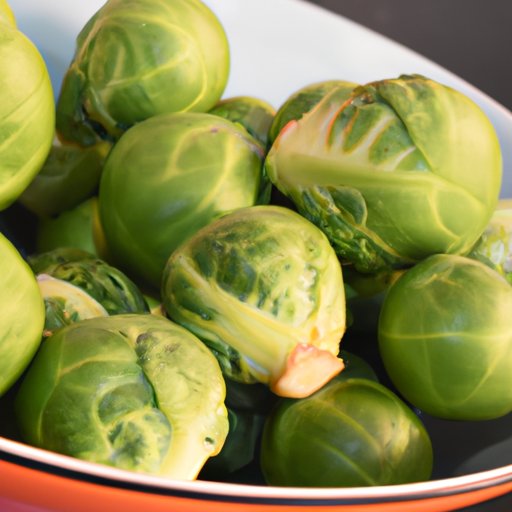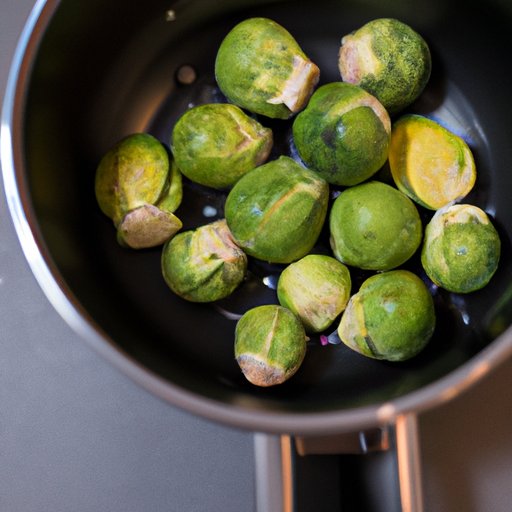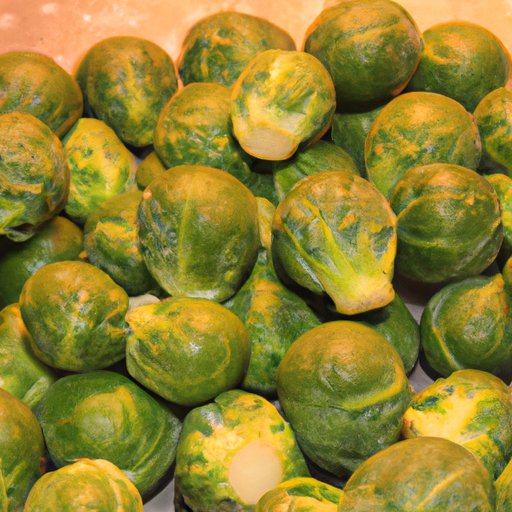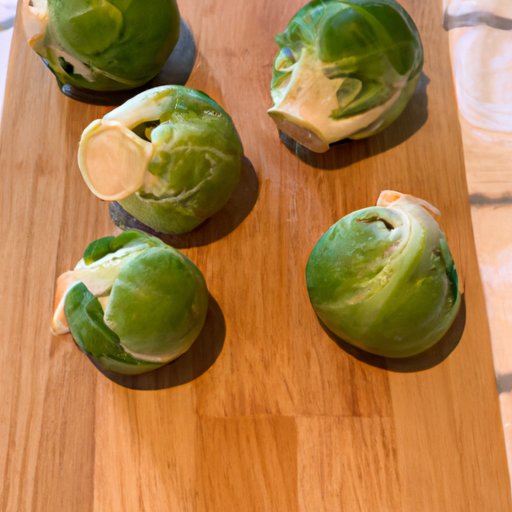Introduction
Brussel sprouts are small, cabbage-like vegetables that grow in tight clusters on a tall stalk. They were first cultivated in Belgium in the 13th century and have since become popular around the world. These little cruciferous vegetables are packed with nutrition and can be a great addition to any diet.
The purpose of this article is to explore the nutritional benefits, potential health risks, and overall safety of eating brussel sprouts. We’ll look at how to prepare them for maximum nutrition, common misconceptions about their safety, and what the latest studies say about their long-term health effects. Finally, we’ll discuss the pros and cons of incorporating brussel sprouts into your diet and provide tips for doing so.

Nutritional Benefits of Eating Brussel Sprouts
Brussel sprouts are an excellent source of nutrition, containing a variety of vitamins and minerals. One cup of cooked brussel sprouts contains over 100% of the recommended daily intake of vitamin C, as well as high levels of vitamin K, folate, and manganese. They also contain antioxidants, which help protect the body from free radical damage and may reduce the risk of certain diseases.
Brussel sprouts are also high in fiber, with one cup providing 4 grams of dietary fiber. Fiber helps keep the digestive system healthy and can help lower cholesterol levels. Additionally, fiber can help you feel full longer, making it easier to maintain a healthy weight.
Health Risks Associated With Eating Brussel Sprouts
While brussel sprouts are generally considered safe to eat, there are some potential health risks associated with consuming them. First, some people may be allergic to brussel sprouts and may experience adverse reactions after eating them. Symptoms of an allergic reaction include itching, swelling, hives, and difficulty breathing.
Additionally, brussel sprouts are high in vitamin K, which can interfere with certain medications, such as blood thinners. People taking these medications should speak to their doctor before consuming brussel sprouts.

How to Prepare Brussel Sprouts for Maximum Nutrition
When selecting brussel sprouts, look for fresh, firm sprouts that are bright green in color. Avoid sprouts that are yellowing or have brown spots. When preparing brussel sprouts, it’s important to cook them properly in order to maximize their nutritional benefits. Boiling or steaming are the best methods for preserving the nutrients in brussel sprouts.
It’s also important to note that overcooking brussel sprouts can reduce their nutritional content. For best results, cook them until they are just tender, but still crisp. Additionally, roasting or sautéing brussel sprouts can add flavor, but should be done in moderation to avoid reducing their nutritional content.
Common Misconceptions About the Safety of Eating Brussel Sprouts
Despite their many nutritional benefits, there are some misconceptions about the safety of eating brussel sprouts. Some people believe that brussel sprouts are toxic and can cause serious health problems. However, there is no scientific evidence to support this claim.
Another common misconception is that brussel sprouts can raise cholesterol levels. While brussel sprouts do contain some fat, they are low in saturated fat and cholesterol and can actually help lower cholesterol levels. Additionally, brussel sprouts are a good source of fiber, which can help reduce cholesterol levels.

What the Latest Studies Say About Eating Brussel Sprouts
Recent studies suggest that eating brussel sprouts can have long-term health benefits. A study published in the Journal of Nutrition found that eating brussel sprouts regularly may reduce the risk of certain types of cancer. Additionally, the nutrient profile of brussel sprouts has been linked to improved cardiovascular health.
Overall, the research suggests that eating brussel sprouts can provide numerous long-term health benefits. However, more research is needed to fully understand the impact of consuming brussel sprouts on overall health.

The Pros and Cons of Eating Brussel Sprouts
There are both pros and cons to eating brussel sprouts. On the plus side, they are an excellent source of nutrition, containing a variety of vitamins and minerals. Additionally, they are low in calories and high in fiber, making them a great choice for weight management. Finally, recent studies suggest that eating brussel sprouts regularly may reduce the risk of certain types of cancer.
On the other hand, there are some potential risks associated with eating brussel sprouts. Some people may be allergic to brussel sprouts, and they are high in vitamin K, which can interfere with certain medications. Additionally, overcooking brussel sprouts can reduce their nutritional content.
Tips for Incorporating Brussel Sprouts into Your Diet
If you’re looking to incorporate more brussel sprouts into your diet, there are a few simple tips to keep in mind. First, variety is key. Try different cooking methods, such as roasting, steaming, or sautéing. Additionally, combine brussel sprouts with other foods, such as lean proteins or other vegetables, to create a balanced meal.
Finally, don’t be afraid to experiment with recipes. There are a variety of ways to enjoy brussel sprouts, from salads to soups to stir-fries. Have fun and find new ways to enjoy this nutritious vegetable.
Conclusion
In conclusion, brussel sprouts can be a great addition to any diet. They are an excellent source of nutrition, containing a variety of vitamins and minerals, antioxidants, and fiber. While there are some potential health risks associated with eating brussel sprouts, such as allergic reactions and high levels of vitamin K, these risks can be minimized by choosing the right sprouts and cooking them properly.
Overall, the research suggests that eating brussel sprouts can provide numerous long-term health benefits. If you’re looking to incorporate more brussel sprouts into your diet, remember to vary your cooking methods and combine them with other foods for a balanced meal. With the right preparation, brussel sprouts can be a delicious and nutritious part of any diet.
(Note: Is this article not meeting your expectations? Do you have knowledge or insights to share? Unlock new opportunities and expand your reach by joining our authors team. Click Registration to join us and share your expertise with our readers.)
